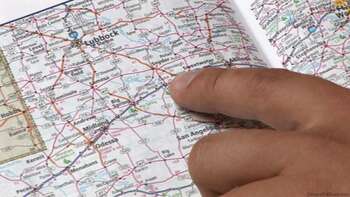One of the most common questions people ask is how can I find my way into the religion? It seems so secretive and hard to penetrate. How can I find a community near me? How can I find an elder who will mentor me? Let's take these questions apart in order to answer them, and let's throw a few more questions into the mix to give you food for thought.
Examine honestly your reasons for wanting
to be in the religion
 Why doesn't the door open for me?
Why doesn't the door open for me? The answer will be different for everyone, but it's important to be clear in your own mind about where the desire comes from. What do you know about the religion already? What is it about the religion that appeals to you? What makes you believe this religion is a good fit for you? Some people feel a cultural connection to the religion, and see it as a way to connect with their ancestors and their roots. Obviously, if you were raised in a family of Orisha worshippers, you've grown up with the religion and have a clear understanding of how one gets involved in it. But if you are NOT from an Orisha background, what draws you to it? Some people are attracted to it because it represents an extension of their other spiritual practices, like hoo-doo, espiritismo, wicca, reiki, tarot reading, and the like. Some people feel they're being called by an Orisha or pushed by egun, or they are being led by their ori. Some have rejected the religion they were raised in and want something different. Whatever your reason is, make sure you understand what's motivating you, and you're honest with yourself about your expectations and desires. When the time comes to work with a community of Orisha worshippers, you need to be clear about what you want, and you need to be able to communicate your expectations to them. If there are any mismatches between your desires and expectations and what the community can offer you, it's easy to spot them immediately if you can verbalize what is drawing you to the religion.
Consider the logistical and practical issues that might get in your way
 Is there a community near me?
Is there a community near me? If you live in Miami, NYC, Los Angeles, Chicago, or another city where there are a significant number of Orisha priests, it's much easier to find a community. Look around. There might be cultural centers in your community with an Africana focus. You can attend drummings or dance performances or lectures where Olorishas might be in attendance. There might be public events sponsored by groups like Oloshas United, such as river clean-ups and tributes to the Orishas, or spiritual cleaning ceremonies for the community. If you follow these groups on facebook, you know what they're planning, and you can attend. If you keep your eyes open, and make an effort to get out and about, you'll start to notice there are Olorishas in your community. We always say that the Orishas work in mysterious ways and when you are ready to meet your teacher, the teacher will appear. However, if you live in a remote, isolated place where there's little or no Orisha community, it's going to be much harder! In all likelihood, you'll need to consider frequent travel or moving to another location. If you are truly meant to be in the religion and are determined to find a way in, you may have to go to the mountain. You can't always expect the mountain to come to you. Orisha worship has spread around the globe, but there are still areas with few Orisha priests, and other areas with a heavy population of Olorishas and babalawos. Where you live matters.
Understand that long-distance and internet relationships are very limited
 Computer-based relationships won't get you where you want to go
Computer-based relationships won't get you where you want to go There's nothing wrong with having a network of people on the internet who share your interest in the religion. You may even find a priest willing to guide you and teach you via the internet. But, you have to realize these relationships are limited, and can never replace real-life face-to-face encounters with Olorishas. If you are going to undergo any kind of Orisha ceremony, it must be done in person. If you are going to become part of a lineage, a house, a community, you must be able to attend and participate in real-time events. Videos and podcasts and blogs don't take the place of real-time instruction and community building. Sooner or later, you're going to have to be physically present at events, and get to know people who live near you, who can invite you to take part in religious activity. If no one lives near you, you'll have to travel, and that means spending money, taking time off from work, and committing to spending time with people in another place who can become your religious family. If you are an English speaker and you go to a community where everyone speaks only Spanish, how likely is it that you will ever "fit in" with those people? Communication is essential, so make sure you speak the language and understand the cultural heritage of people who are going to be your elders and your teachers. We define "ilé" not just as a temple-house where we do our ceremonies, but it also refers to a group of people who are connected via common godparents. When you receive orishas in ceremony from a godparent, you become part of the ilé and part of a specific lineage. The lineage is your religious family. When you're initiated to Ocha, the people in the ilé are your religious family for the rest of your life. That's why you must be sure you're committing to the right people. A community is a broader, more generic terms that just means people with shared experiences and practices We're all part of an Orisha community. We can find an Orisha community on the internet. But to belong to an ilé and a lineage is very different. These connections are established in person. Since teaching takes place at the ilé level, without a godparent and religious family, how much you learn will be very limited.
Finding the right connection takes time
and requires critical thought
 Impatience and haste can lead to serious problems
Impatience and haste can lead to serious problems There are a lot of frauds out there, people who claim to be priests who actually aren't, people who will offer you Orishas when they have no authority to give them, people who will take your money to do long-distance ebó for you when they have no intention of ever doing anything except collecting money from you. There are priests who go fishing on the internet to catch godchildren, and they will make promises they don't keep. So, how can you know if someone is honest? How can you protect yourself from fraud? My answer starts with: Use common sense. The vast majority of honest priests are NOT going to be on the internet fishing for godchildren. Why? Because we already have godchildren, we have busy lives, we aren't using the religion to make money. We have jobs, we have families, we have other commitments. If someone is PM'ing you and everyone else in a religious forum with 10,000 members offering services, you have to ask: WHY? Most of us believe it's not ethical to reach out to total strangers and offer unsolicited services. We like to choose the people we work with. We like to take time to get to know the people and establish a relationship with them. We're selective. Most of us want to help people who need help, and we're open to establishing relationships with new people, but we don't solicit customers on the internet. Second, my advice is to follow your gut instinct. If someone is too eager to help you, too free with promises, or offering you things that seem too good to be true, chances are there's something wrong. Your gut warns you about these things. When you have a nagging suspicion that things aren't right, listen. Sometimes this is how your ori, egun, spirit guides and even the Orishas let you know that you're on the wrong path. Third, I suggest you ask around. What's the reputation of this person offering you such services? Do other godchildren speak well of him? Do other olorishas in the community respect him? No one works in a vacuum - if they do, that's another serious warning sign!! If you have any reason to suspect someone isn't on the up and up, ask around. Finally, TAKE YOUR TIME AND BE PATIENT. There's no way around that bit of advice. No one wants to hear a plea for patience when they're in a hurry, but rushing is the surest way to make a mistake. Go step by step, keep your eyes open, be honest with yourself about what you want and why, and look for someone who is a good fit for you, so the relationship has a chance to grow and flourish. It will come when the time is right.
 RSS Feed
RSS Feed
